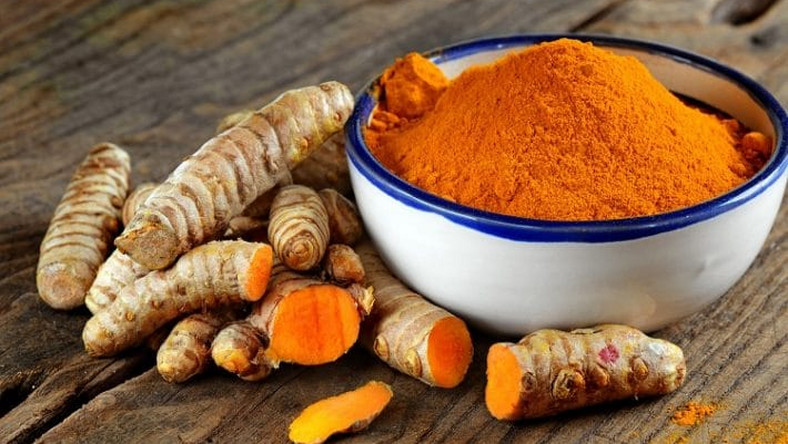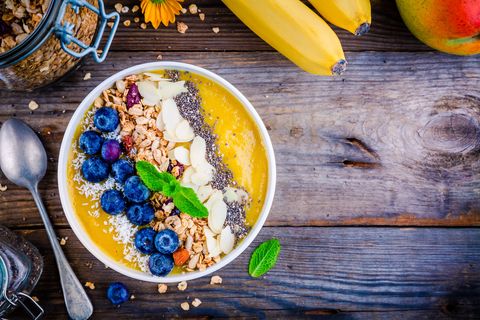Take this quick quiz to find out.
Turmeric is popping up everywhere these days—from spicing up smoothies and stir-fries to coloring curries, soups, and even teas.
Derived from the stem of the Curcuma longa plant then ground into a powder, turmeric originated in India and has been around for thousands of years. Many cultures have used turmeric for cooking, religious significance, and medicinal purposes, such as treating cuts and burns, relieving GI distress, improving blood circulation, and curing the common cold.

But does the golden yellow powder really live up to all the hype? Take this quick quiz to see if you can decipher the facts from the fiction when it comes to this spice.
The answer: Yes, it can help.
Turmeric contains a compound called curcumin, which has anti-inflammatory properties, according to New York City-based dietitian Natalie Rizzo, R.D. That could be beneficial in preventing chronic inflammation, which is responsible for issues like arthritis, an inflammatory disease of the joints; depression and anxiety, which has been associated with inflammation in the brain; heart disease, which is caused by an inflammatory response to the buildup of fatty plaque in your arteries; and cancer, in which inflammation is a component of tumor progression.
For us runners specifically, turmeric can help with the acute—or short-term—inflammation in the joints after a long run. “We want to prevent that inflammation or treat it as much as possible to help with the pain,” Rizzo says. “If we don’t, it could lead to chronic inflammation, which is associated with developing diseases.”
It can also be helpful to speed up recovery after a workout, according to Frank Lipman, M.D., founder and director of the Eleven Eleven Wellness Center in New York City. And Rizzo agrees, saying it can be beneficial in preventing delayed onset muscle soreness (DOMS). A 2017 study in The FASEB Journal supports this, finding that participants who supplemented with curcumin had less overall muscle soreness than those who didn’t.
What’s more, turmeric is much easier on your body than taking an over-the-counter NSAID, Lipman says, which can have unwanted side-effects, such as stomach ulcers or heartburn.
The answer: Turmeric is beneficial for many facets of your overall health.
“It has positive effects on brain function and cardiovascular health, can interrupt the normal progression of cancer cells, and help slow aging by slowing your telomeres from shortening,” Lipman says. (Telomeres are found at the end of every chromosome, and they help cells divide. Every time a cell divides, the telomeres get shorter and shorter until they can’t divide anymore.)
A 2018 study published in The American Journal of Geriatric Psychiatry found that when participants took 90 milligrams of curcumin twice a day, they saw improvements in their memories and attention spans. “[These] behavioral and cognitive benefits are associated with decreases in plaque and tangle accumulation in brain regions modulating mood and memory,” the study states.
[From training tips, to fueling strategies, to improving the mind-body connection, the Runner’s World 2020 Calendar will help you run your best all year long.]
The answer: Well…it depends.
For specific therapeutic uses, like treating arthritis, a turmeric supplement at a higher dose—up to 4 grams per day—is more beneficial, according to Lipman. Look for the active property curcumin, he says. And make sure the supplement has no food coloring or fillers either.
But if you’re just looking to stay healthy and use turmeric as a preventative measure, adding it to your foods is a safe bet. “It’s a spice you can add to anything—roasted veggies, eggs, soup, etc.,” Rizzo says.
Rizzo says ½ to 1 tablespoon of turmeric a day will give you most of the benefits. Keep in mind, your body absorbs turmeric best when you pair it with certain nutrients. For instance, the piperine in black pepper and the fats in things like olive oil and avocados help your body process it best.
Consuming more than the recommended amount could cause GI distress for some people, Lipman says. But because research has shown that different amounts of turmeric and curcumin are recommended to help treat different diseases, always check in with your doctor first for the best treatment and dosage for any medical condition you may have.
A true love for sports






Recent Comments